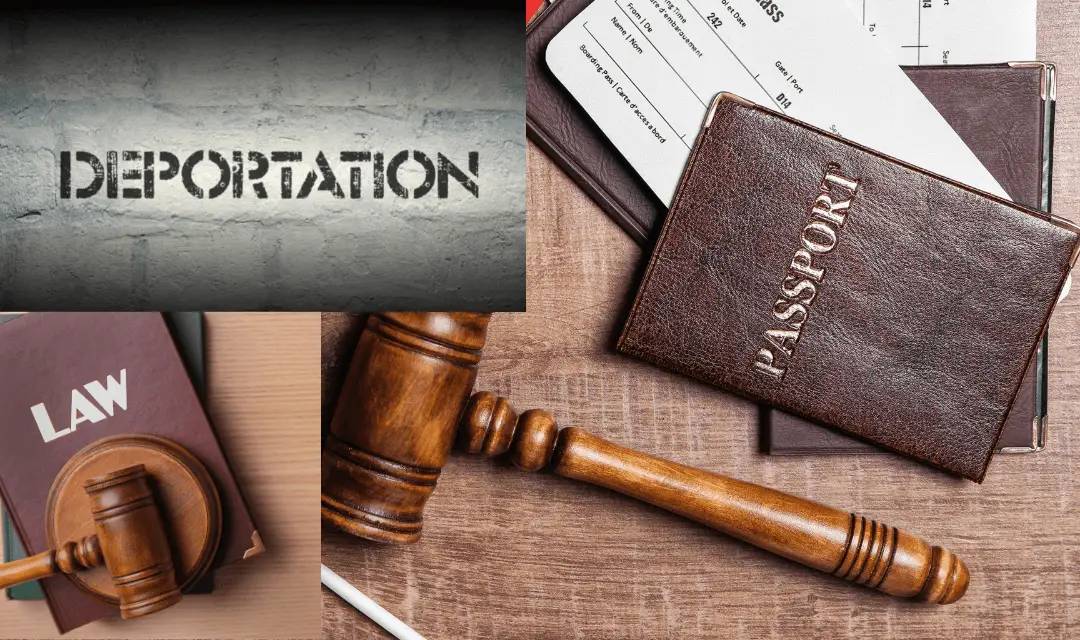The capability and capacity to deport a foreigner or an alien is an exclusive power and inherent authority of the foreign country in which he is residing or a transient thereof.
Deportation is defined as a means in which a foreigner or an alien who is residing in a foreign country is deported or removed therefrom after being adjudged by a competent authority to have violated the immigration laws or any punitive state statutes, as the case may be.
Likewise, he is subject to deportation if he has been declared a clear and present danger because his presence is deemed contrary to public welfare under such law of the country where he is residing.
In the case of Tan Tong vs. Deportation Board,1 the Supreme Court held that the power to deport aliens is lodged in the President of the Republic of the Philippines.
Furthermore, under Section 37 of Commonwealth Act No. 6132 otherwise known as “The Philippine Immigration Act of 1940”, it states that:
“aliens shall be arrested upon the warrant of the Commissioner of Immigration or of any other officer designated by him for the purpose and deported upon the warrant of the Commissioner of Immigration after a determination by the Board of Commissioners of the existence of the ground for deportation as charged against the alien.”
Who has the Power and Authority to Deport Aliens or Foreigners?
It is the President who has the power and authority to deport foreigners or aliens, subject to due process.
In the case of Tan Tong vs. Deportation Board,3 decided by the Supreme Court, it held that:
“as an act of State, the power to deport aliens is vested in the Executive department, subject to the regulations stated in Section 69 of the Revised Administrative Code or to such future legislation as may be promulgated on the subject.”
In the case of Tan Sin vs. The Deportation Board,4 it stated that under Section 37 of Commonwealth Act No. 613, it merely enumerates the reasons or grounds for which an alien or a foreigner may be arrested upon warrant of the Commissioner or any officer designated by him for the purpose.
After determination by the Board of Commissioners of the existence of the ground for deportation, an alien may be deported upon warrant issued by the said commissioner.
How Long is the Deportation Process?
The deportation process has to comply with due process. Hence, a complaint, investigation, and decision should ensue.
The time for such process may vary, depending upon certain contingencies. Nonetheless, the investigation from the time the complaint is referred to the Board of Commission shall under the rules not exceed sixty (60) days.5
Corollarily, under Chapter 3- Power Over Aliens, Section 10 of the Administrative Code of 1987,6 it states that:
“the decision of the Board of Commissioners which has jurisdiction over all deportation cases shall become final and executory after thirty (30) days from promulgation, unless within such period the President shall order the contrary.”
How long does it take for someone to get deported?
Unless the alien is a fugitive from justice or has served his sentence,7 the proceedings for deportation shall first undergo an investigation, commenced by the the filing of the complaint against the sought to be deported foreigner.
Under the Immigration Memorandum Circular SBM – 2015 -0108, the proceedings shall be decided within a period of sixty (60) days from referral.9
After the proceedings and the Decision of the Board of Commissioner (BOC) finds that the foreigner or alien must be deported, the said decision shall become final and executory after thirty (30) days from its promulgation.
However, the President, under the Revised Administrative Code of the Philippines10 shall have the power to order the contrary, if he deems to do so.
Status Quo
The foreigner, yet, may appeal the deportation ruling of the BOC before the Department of Justice or Office of the President.11
During the pendency of the appeal, the same shall stay the execution of the Decision of the BOC.12 Hence, unless the President otherwise orders, the subject alien are allowed to stay in the Philippines even after 30 days while their appeal is pending before the Department of Justice (DOJ).
This has been the practice of some aliens or foreigners who are overstaying and have overstayed here in the Philippines for a long period of time, regardless of various reasons that may arise while their appeal is pending.
It is noteworthy to remember that, despite the immigration laws in place, the strict provision of our law regarding their deportation are being tested. Illegal aliens have overstayed and are currently overstaying leading to a slow-moving process in our deportation cases.
Bureau of Immigration | Deportation Process
The Bureau of Immigration (BI) is the country’s immigration regulatory and control body that is primarily mandated and in-charge of the administration and enforcement of immigration, citizenship, and alien or foreigner’s registration and admission pursuant to the provisions of the Philippine Immigration Act.
It also supervises the immigration of alien or foreign nationals from the Philippines. It is headed by a Commissioner and two (2) Associate Commissioners.
The Philippine Immigration Act of 194013 states the deportation process in the Philippines. Under Section 37 (a)14 of the above law, this merely enumerates the grounds for which an alien or foreigner may be arrested.
On the other hand, the Board of Commissioner (BOC) shall have the jurisdiction to hear and decide deportation cases.15
There are thirteen (13) grounds for deportation listed in this section, which we will tackle on the succeeding chapters.
Alien or foreigner that is being deported shall be informed of the specific grounds for deportation and be given a hearing under rules of procedure prescribed by the Commissioner of Immigration.
In a deportation proceeding which involves the entry of an alien, the proof shall be upon the foreigner showing that he entered the Philippines lawfully, and the time, place and manner of the entry.
With this purpose, he is entitled to a statement of the facts in connection with his arrival as shown in a record by the Bureau of Immigration.
As may be imposed by the Commissioner of Immigration, an alien or foreigner who is under arrest in any deportation proceeding may be released under bond or such conditions.
Moreover, at the option of the Commissioner, an alien who is ordered to be deported shall be removed to the country whence he came, or to the foreign port at which he embarked for the Philippines, or the country of nativity of which he is a citizen, or the country in which he resided prior to coming to the Philippines.
Lastly, if within five (5) years after entry the deportation proceedings are instituted, unless deportation is made by reason which arise subsequent to the entry of alien, the deportation cost from the port of deportation shall be at the expense of the owner of vessel in which the alien came, and if not practicable, the cost of deportation shall be payable from the appropriations available.
What is the most common reason for deportation?
The Bureau of Immigration merely supervises the immigration of alien or foreign nationals from the Philippines.
Yet, when the President of the Philippines, upon his sole judgement that an alien or foreigner is undesirable, the latter’s right to stay in our country will be revoked.
The most common reason for deportation in the Philippines is the violation of Philippine Immigration law, specifically violations that pose a public threat in our country. (i.e. possession of drugs, murder, prostitution, human trafficking, fraud, scams, economic crime, cybercrime)
These aliens or foreigners are deported back to their country where they came from. Some of them have existing cases and are wanted fugitives and they have been charged or convicted of various crimes.
Aliens or foreigners that are deported will be placed in the blacklist of the Bureau of Immigration automatically, and therefore banned from re-entering our country.
In general, the most common reason for deportation is the violation of our own laws that will also endanger the lives of the Filipinos in general, disrespect the latter’s basic human rights, and will pose a great threat to the country’s public safety.
What are the grounds for deportation?
Under “The Philippine Immigration Act of 1940″16, it states the grounds for deporting an alien or foreigner here in the Philippines. Thus:
“Upon the warrant of the Commissioner of Immigration or any other officer designated by him and deported upon the warrant of the Commissioner of Immigration after determining by the Board of Commissioners of the existence of the ground for deportation, the following aliens shall be arrested:17
“Any alien who enters the Philippines after the effective date of this Act by means of false and misleading statements or without inspection and admission by the immigration authorities at a designated port of entry or at any place other than at a designated port of entry;18
“Any alien who enters the Philippines after the effective date of this Act, who was not lawfully admissible at the time of entry;19
“Any alien who, after the effective date of this Act, is convicted in the Philippines and sentenced for a term of one year or more for a crime involving moral turpitude committed within five years after his entry to the Philippines, or who, at any time after such entry, is so convicted and sentenced more than once;20
“Any alien who is convicted and sentenced for a violation of the law governing prohibited drugs;21
“Any alien who practices prostitution or is an inmate of a house of prostitution or is connected with the management of a house of prostitution, or is a procurer;22
“Any alien who becomes a public charge within five years after entry from causes not affirmatively shown to have arisen subsequent to entry;23
“Any alien who remains in the Philippines in violation of any limitation or condition under which he was admitted as a nonimmigrant;24
“Any alien who believes in, advises, advocates or teaches the overthrow by force and violence of the Government of the Philippines, or of constituted law and authority, or who disbelieves in or is opposed to organized government or who advises, advocates, or teaches the assault or assassination of public officials because of their office, or who advises, advocates, or teaches the unlawful destruction of property, or who is a member of or affiliated with any organization entertaining, advocating or teaching such doctrines, or who in any manner whatsoever lends assistance, financial or otherwise, to the dissemination of such doctrines;25
“Any alien who commits any of the acts described in sections forty-five and forty-six of this Act, independent of criminal action which may be brought against him: Provided, That in the case of an alien who, for any reason, is convicted and sentenced to suffer both imprisonment and deportation, said alien shall first serve the entire period of his imprisonment before he is actually deported: Provided however, That the imprisonment may be waived by the Commissioner of Immigration with the consent of the Department Head, and upon payment by the alien concerned of such amount as the Commissioner may fix and approved by the Department Head;26
“Any alien who, at any time within five years after entry, shall have been convicted of violating the provisions of the Philippine Commonwealth Act Numbered Six Hundred and Fifty-Three, otherwise known as the Philippine Alien Registration Act of 1941, or who, at any time after entry, shall have been convicted more than once of violating the provisions of the same Act;27
“Any alien who engages in profiteering, hoarding, or black-marketing, independent of any criminal action which may be brought against him;28
“Any alien who is convicted of any offense penalized under Commonwealth Act Numbered Four hundred and seventy-three, otherwise known as the Revised Naturalization Laws of the Philippines, or any law relating to acquisition of Philippine citizenship;29
“Any alien who defrauds his creditor by absconding or alienating properties to prevent them from being attached or executed;30
“x x x x . . . .”
How can you avoid deportation?
In order to avoid deportation, the residence of aliens must be legalized.
The Philippine Immigration Act states:
“that any alien in the Philippines at the time of this passage concerning whom no record of admission for permanent residence exists or can be located may apply to the Commissioner of Immigration for legalization of his residence in the Philippines.”31
On the other hand, the same provision, also, states that:
“any alien in the Philippines, whose record of admission for permanent residence does not exist or cannot be located and who shall fail to legalize his residence in the Philippines as provided in this section, shall be presumed to be unlawfully within the Philippines.32
The Commissioner of Immigration shall have the power and authority to legalize33 the foreigner-applicant’s residence in the Philippines if it finds that the applicant:
(1) entered in the Philippines prior to the effective date of this Act;
(2) has maintained a residence in the Philippines since he entered;
(3) is a person of good moral character is not subject to deportation.
Any alien or foreigner whose residence have been legalized observing the abovementioned provisions of this section are deemed lawfully admitted in the Philippines as of date of their entry.
Lastly, the most important thing to keep in mind in order to avoid deportation: aliens of foreigner residing in our country must adhere and comply with our Immigration laws, our existing laws, and observe good character while being here in the Philippines.
Can marriage stop deportation?
Marriage cannot stop deportation.
As stated in our jurisprudence, in the case of Djumantan vs Domingo34, the Supreme Court held that marriage by an alien to a citizen does not withdraw him/her from the force and effect of the Philippine immigration laws that govern the admission and exclusion of aliens.
Moreover, the Supreme Court reiterated that marriage of an alien woman to a Filipino does not ipso facto make her a citizen of the Philippines. Hence, she is not excused from her failure to depart from the country upon the expiration of her stay in the country as an alien.
In general, the sanctity of marriage cannot actually stop the deportation of your alien or foreigner spouse. They are still subject to Philippine immigration laws and existing statutes in the Philippines.
Similarly, you can still get deported when you violate immigration laws and you have committed a crime.
By having been married to a Filipino spouse, the citizenship of the alien spouse is still the same, unless the latter has been naturalized in accordance with the Philippine law.
In this sense, they are still not a Filipino citizen, hence, subject to Philippine immigration laws and existing statutes regulating the admission and exclusion of aliens.
Final Thoughts
The Philippines is a well-known and a well-loved country all over the world. We are known for our beautiful beaches, diverse cultures and traditions, our love for sports, for being hospitable and etc.
Many tourists and foreigners are coming here to visit, relax, tour, work, and, sometimes, get a family. With all of these reasons, aliens or foreigners forget that they are in other country, with own laws, rules and regulations.
They made violations, crimes and offenses that prejudice the lives of every citizen. The detriment they bring to our country is unimaginable.
They seem too comfortable that they believe the law will not hunt them down. But of course, the law will find its course to punished those who do not obey.
The law and public authorities must be impartial in executing and implementing the law. They must be neutral in order that the law be unbiased also.
They must be free from corrupt motives and interests to advance the interest of the many, and should promote the interest of the law.
Lastly, public authorities, public officials and every citizen must help and support each other to maintain a country that is free from undesirable people. We, all, must advance the interest of the country first, before our own interest.
- G.R. No. L-7680, April 30, 1955[↩]
- The Philippine Immigration Act of 1940[↩]
- Ibid.[↩]
- G.R. No. L-11511, November 28, 1958[↩]
- Infra.[↩]
- Revised Administrative Code[↩]
- Section 6 – 9 of Rule 9 of SBM – 2015 – 010, infra.[↩]
- Bureau of Immigration Omnibus Rule of Procedure of 2015[↩]
- Rule 3, Section 1 of SBM – 2015 – 010[↩]
- Executive Order No. 292, Section 10, Chapter 3[↩]
- Section 6, Rule 10 of SBM – 2015 – 010[↩]
- Section 8, Rule 10 of SBM – 2015 – 010[↩]
- Commonwealth Act No. 613, Supra.[↩]
- Ibid.[↩]
- Section 9, Rule I of SBM – 2015 – 010[↩]
- Section 37 of Commonwealth Act No. 613[↩]
- Ibid.[↩]
- Ibid.[↩]
- Ibid.[↩]
- Ibid.[↩]
- Ibid.[↩]
- Ibid.[↩]
- Ibid.[↩]
- Ibid.[↩]
- Ibid.[↩]
- Ibid[↩]
- Ibid[↩]
- Ibid[↩]
- Ibid.[↩]
- Ibid.[↩]
- Section 41 [a], Commonwealth Act No. 613[↩]
- Ibid.[↩]
- Section 41 [b], Commonwealth Act No. 613[↩]
- G.R. No. 99358, January 30, 1995[↩]




